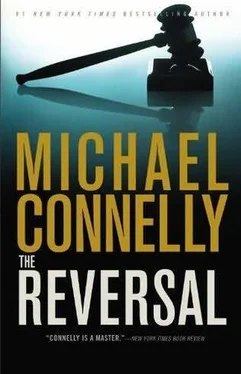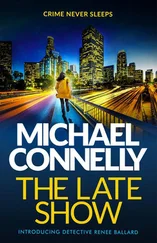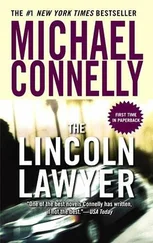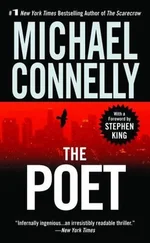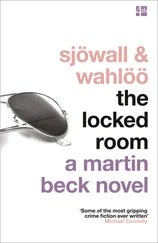“No, I worked my way up. I started as a janitor.”
“I would like to draw your attention back to nineteen eighty-six. You were working there then, correct?”
“Yes, sir. I was a janitor back then.”
“Okay, and do you remember the date of February sixteenth of that year in particular?”
“Yes, I do.”
“It was a Sunday.”
“Yes, I remember.”
“Can you tell the court why?”
“That was the day I found the body of a little girl in the trash bin out back of the El Rey. That was a terrible day.”
I checked the jury. All eyes were on my witness. So far so good.
“I can imagine that being a terrible day, Mr. Johnson. Now, can you tell us what it was that brought you to discover the body of the little girl?”
“We were working on a project in the theater. We were putting new drywall into the ladies’ room on account of a leak. So I took a wheelbarrow full of the stuff we had demoed-the old wall and some rotting wood and such-and wheeled it out to put in the Dumpster. I opened the top and there this poor little girl was.”
“She was on top of the debris already in the trash bin?”
“That’s right.”
“Was she covered at all with any trash or debris?”
“No, sir, not at all.”
“As if whoever threw her in there had been in a hurry and didn’t have time to cover-”
“Objection!”
Royce had jumped to his feet. I knew he would object. But I had almost gotten the whole sentence-and its suggestion-to the jury.
“Mr. Haller is leading the witness and asking for conclusions for which he would have no expertise,” Royce said.
I withdrew the question before the judge could sustain the objection. There was no sense in having the judge side with the defense in front of the jury.
“Mr. Johnson, was that the first trip you had made to the trash bin that day?”
“No, sir. I had been out there two times before.”
“Before the trip during which you found the body, when had you last been to the trash bin?”
“About ninety minutes before.”
“Did you see a body on top of the trash in the bin that time?”
“No, there was no body there.”
“So it had to have been placed in that bin in the ninety minutes prior to you finding it, correct?”
“Yes, that’s right.”
“Okay, Mr. Johnson, if I could draw your attention to the screen.”
The courtroom was equipped with two large flat-screen monitors mounted high on the wall opposite the jury box. One screen was slightly angled toward the gallery to allow courtroom observers to see the digital presentations as well. Maggie controlled what appeared on the screens through a PowerPoint program on her laptop computer. She had constructed the presentation over the last two weeks and weekends as we choreographed the prosecution’s case. All of the old photos from the case files had been scanned and loaded into the program. She now put up the trial’s first photo exhibit. A shot of the trash bin Melissa Landy’s body had been found in.
“Does that look like the trash bin in which you found the little girl’s body, Mr. Johnson?”
“That’s it.”
“What makes you so sure, sir?”
“The address-fifty-five fifteen-spray-painted on the side like that. I did that. That’s the address. And I can tell that’s the back of the El Rey. I’ve worked there a long time.”
“Okay, and is this what you saw when you raised the top and looked inside?”
Maggie moved to the next photo. The courtroom was already quiet but it seemed to me that it grew absolutely silent when the photo of Melissa Landy’s body in the trash bin went up on the screens. Under the existing rules of evidence as carved by a recent ruling by the Ninth District, I had to find ways of bringing old evidence and exhibits to the present jury. I could not rely on investigative records. I had to find people who were bridges to the past and Johnson was the first bridge.
Johnson didn’t answer my question at first. He just stared like everyone else in the courtroom. Then, unexpectedly, a tear rolled down his dark cheek. It was perfect. If I had been at the defense table I would have viewed it with cynicism. But I knew Johnson’s response was heartfelt and it was why I had made him my first witness.
“That’s her,” he finally said. “That’s what I saw.”
I nodded as Johnson blessed himself.
“And what did you do when you saw her?”
“We didn’t have no cell phones back then, you see. So I ran back inside and I called nine-one-one on the stage phone.”
“And the police came quickly?”
“They came real quick, like they were already looking for her.”
“One final question, Mr. Johnson. Could you see that trash bin from Wilshire Boulevard?”
Johnson shook his head emphatically.
“No, it was behind the theater and you could only see it if you drove back there and down the little alley.”
I hesitated here. I had more to bring out from this witness. Information not presented in the first trial but gathered by Bosch during his reinvestigation. It was information that Royce might not be aware of. I could just ask the question that would draw it out or I could roll the dice and see if the defense opened a door on cross-examination. The information would be the same either way, but it would have greater weight if the jury believed the defense had tried to hide it.
“Thank you, Mr. Johnson,” I finally said. “I have no further questions.”
The witness was turned over to Royce, who went to the lectern as I sat down.
“Just a few questions,” he said. “Did you see who put the victim’s body in the bin?”
“No, I did not,” Johnson said.
“So when you called nine-one-one you had no idea who did it, is that correct?”
“Correct.”
“Before that day, had you ever seen the defendant before?”
“No, I don’t think so.”
“Thank you.”
And that was it. Royce had performed a typical cross of a witness who had little value to the defense. Johnson couldn’t identify the murderer, so Royce got that on the record. But he should have just let Johnson pass. By asking if Johnson had ever seen Jessup before the murder, he opened a door. I stood back up so I could go through it.
“Redirect, Mr. Haller?” the judge asked.
“Briefly, Your Honor. Mr. Johnson, back during this period that we’re talking about, did you often work on Sundays?”
“No, it was my day off usually. But if we had some special projects I would be told to come in.”
Royce objected on the grounds that I was opening up a line of questioning that was outside the scope of his cross-examination. I promised the judge that it was within the scope and that it would become apparent soon. She indulged me and overruled the objection. I went back to Mr. Johnson. I had hoped Royce would object because in a few moments it would look like he had been trying to stop me from getting to information damaging to Jessup.
“You mentioned that the trash bin where you found the body was at the end of an alley. Is there no parking lot behind the El Rey Theatre?”
“There is a parking lot but it does not belong to the El Rey Theatre. We have the alley that gives us access to the back doors and the bins.”
“Who does the parking lot belong to?”
“A company that has lots all over the city. It’s called City Park.”
“Is there a wall or a fence separating this parking lot from the alley?”
Royce stood again.
“Your Honor, this is going on and on and it has nothing to do with what I asked Mr. Johnson.”
“Your Honor,” I said. “I will get there in two more questions.”
“You may answer, Mr. Johnson,” Breitman said.
“There is a fence,” Johnson said.
Читать дальше
